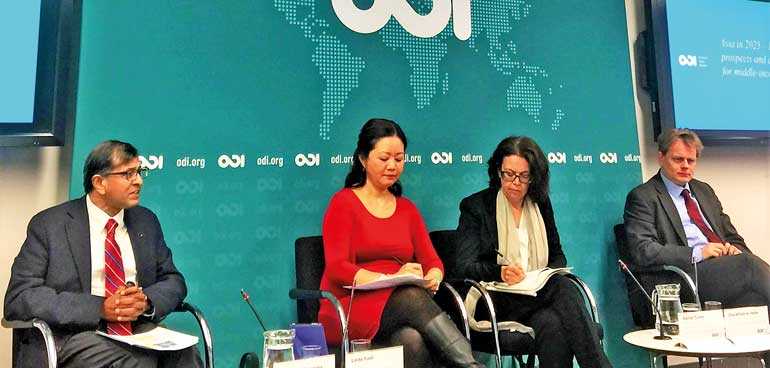Monday Feb 23, 2026
Monday Feb 23, 2026
Wednesday, 29 May 2019 01:08 - - {{hitsCtrl.values.hits}}

Dr. Ganeshan Wignaraja, Executive Director at the Lakshman Kadirgamar Institute of International Relations and Strategic Studies (LKI), recently spoke at the Overseas Development Institute (ODI), an independent global think tank in London.
Others in the panel discussion included Dr. Indrajit Coomaraswamy, Governor of the Central Bank of Sri Lanka (via video conference); Rachel Turner, Director of Economic Development, UK Department for International Development; and Dr. Dirk Willem te Velde, Principal Research Fellow and Head of International Economic Development Group ODI. The discussion was moderated by Prof. Linda Yueh, Fellow in Economics, University of Oxford, Adjunct Professor of Economics, London Business School, and Visiting Professor, London School of Economics and Political Science.
The panel discussion was based on a 2018 ODI study titled ‘Asia in 2025: Development Prospects and Challenges for Middle-Income Countries’, co-authored by Dr. Wignaraja, Dr. Judith Tyson, Dr. Annalisa Prizzon and Dr. te Velde.
Dr. Wignaraja spoke on the challenges facing middle-income countries in Asia, including escalating trade protectionism, graduation from international support measures, external debt, and an ageing population. Asia is continuing its development success story and is poised to become a middle-income region, with the exception of Nepal and Afghanistan. However, there are several challenges. He projected that by 2025, the region will comprise about a third of the world economy. However, the pace of growth in the region is expected to be slower than before, as trade is now likely to play less of a role in economic growth.
He noted that while poverty levels in the region have fallen drastically, income inequality between and within countries is on the rise. This needs to be addressed through measures, including safety nets, micro-financing, and education of girls.
In his presentation, Dr. Coomaraswamy stated that although rising income inequality was a significant threat to the region, Sri Lanka has seen balanced growth without a significant increase in the Gini coefficient. Sri Lanka is also facing an ageing demographic, but this can be offset by increased female labour participation, which remains at 35%. Female enrolment in tertiary education, however, is high.
Dr. Coomaraswamy also spoke on the improvement of Sri Lanka’s fiscal policy, a new Inland Revenues Act, elimination of VAT exemptions to increase revenues, and new formulas for electricity and fuels. He noted that the new monetary policy will manage the flexibility for exchange rates to target inflation. He also stated that Sri Lanka was well located to take advantage of the region’s supply chains and manage its debt.
LKI is a think tank that analyses Sri Lanka’s international relations and strategic interests, to provide insights and recommendations that advance justice, peace, prosperity, and sustainability. The Institute reflects the vision of the late Lakshman Kadirgamar by promoting the country’s intellectual profile in foreign policy research and engagement. The livestream of the panel discussion can be accessed at https://www.odi.org/events/4622-asia-s-economic-prospects.